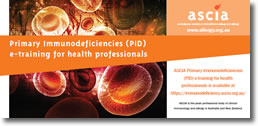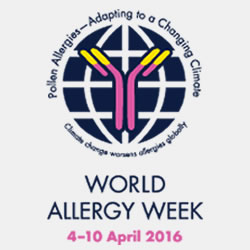Update on Allergy Prevention in Infants
 Recently published studies do not support the delayed introduction of potentially allergenic foods nor the use of partially hydrolysed formula for allergy prevention in infants.
Recently published studies do not support the delayed introduction of potentially allergenic foods nor the use of partially hydrolysed formula for allergy prevention in infants.
ASCIA Guidelines for infant feeding and allergy prevention and information on how to introduce solid foods to infants were released on 18 May 2016 on the ASCIA website:
www.allergy.org.au/patients/allergy-prevention
These documents reflect the findings of recent studies and combine the information from the previous ASCIA Infant Feeding Advice and ASCIA Guidelines for Allergy Prevention.
The Guidelines also include 3 revised recommendations, based on a consensus agreement by participants in the Centre for Food & Allergy Research (CFAR) Infant Feeding Guidelines Summit, hosted by Murdoch Children's Research Institute (MCRI) on Friday 13th May 2016.
This Summit resulted in consensus, as reported in Health Matters:
www.abc.net.au/radionational/programs/healthreport/new-recommendations-for-infant-feeding/7417846



 Climate changes are lengthening the pollen allergy seasons resulting in increased intensity of allergen exposure world-wide.
Climate changes are lengthening the pollen allergy seasons resulting in increased intensity of allergen exposure world-wide.  AIFA welcomed Michael Fries and his support crew into Circular Quay on 31st March after his epic ride from Melbourne. The team raised over $3200 for AIFA and spread the word through regional Victoria and NSW about our work.
AIFA welcomed Michael Fries and his support crew into Circular Quay on 31st March after his epic ride from Melbourne. The team raised over $3200 for AIFA and spread the word through regional Victoria and NSW about our work. Dorotea was diagnosed with Food Protein Induced Enterocolitis Syndrome (FPIES) at 4 months of age. This year research funding from AIFA is targeted at finding out more about this condition to help children like her. See
Dorotea was diagnosed with Food Protein Induced Enterocolitis Syndrome (FPIES) at 4 months of age. This year research funding from AIFA is targeted at finding out more about this condition to help children like her. See  Michael Fries is preparing to undertake a significant mental and physical challenge to raise money for AIFA.
Michael Fries is preparing to undertake a significant mental and physical challenge to raise money for AIFA.